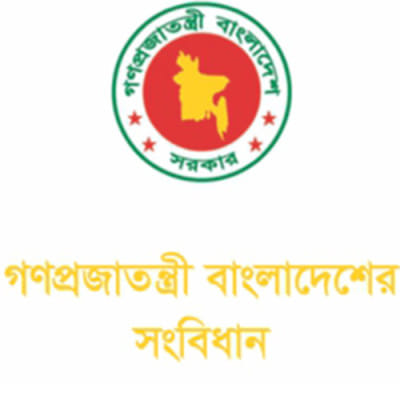Is president's control on lower judiciary 'unconstitutional'?

Chief justice Surendra Kumar Sinha's remarks that the constitutional provision empowering the president to control posting, promotion and discipline of lower court judges contradicts the basic structure of the constitution, are very significant and should be taken seriously.
While speaking at a programme at the Supreme Court Bar Association on Saturday, he also said the present article 116 of the constitution that provides the president with the powers is "unconstitutional".
He hoped the parliament would scrap the two provisions and restore the original article of the constitution in this regard.
Read More: End 'dual rule' in judiciary
The chief justice's remarks should not be taken lightly. Those who have taken oaths under the constitutional provision to preserve, protect and defend the constitution and are also involved with the exercise of the powers to control the lower judiciary should consider the CJ's remarks seriously.
Also Read: Story of how independence of judiciary slowly undermined
At present, President Abdul Hamid, Prime Minister Sheikh Hasina, Chief Justice SK Sinha, law justice and parliamentary affairs minister and judges of the Supreme are among others involved with the exercise of the powers.
Article 116 of the constitution states, "The control (including the power of posting, promotion and grant of leave) and discipline of persons employed in the judicial service and magistrates exercising judicial functions shall vest in the President and shall be exercised by him in consultation with the Supreme Court."
A simple reading of the above article suggests that the president exercises the powers only in consultation with the Supreme Court. And this may mean the prime minister, head of the government, has nothing to do with this as there is no reference to the premier in the above article.
But the truth lies somewhere else. Article 116 cannot be read in isolation from the constitution's article 48 (3) that clearly says: "In the exercise of all his functions, save only that of appointing the Prime Minister pursuant to clause (3) of Article 56 and the Chief Justice pursuant to clause (1) of Article 95, the President shall act in accordance with the advice of the Prime Minister."
Even in these two cases, the president's discretionary power is very nominal. Because he has no option but to appoint the leader of the majority party in parliament as the prime minister.
And in case of the appointment of chief justice, the president is expected to appoint the senior most judge of the Appellate Division.
So, the president takes advice from the primes minister under article 48 (3) to exercises the powers of article 116.
Independence of judiciary is one of the basic structures of the constitution. This has been resolved in a number of judgements delivered by the SC in past and there is no dispute over it.
The original article 116 of 1972 constitution had empowered the SC to have full control over the lower tier of judiciary.
It was aimed at establishing an independent judiciary by keeping it free from interference by the government. And it was in line of the fundamental principle of the State policy in article 22 which speaks for separation of judiciary from the executive branch of the State.
But the fourth amendment in 1975 brought drastic changes to the constitutional provisions pushing the matter in the opposite direction, by allowing the executive branch to control the lower tier of the judiciary.
The Supreme Court was denied the power to have control over the lower courts' judges including promotion, postings and disciplinary actions. Instead, the president, who was all-powerful head of the government after the country switched to the presidential form of the government through the fourth amendment, was given all these powers.
The martial law regime led by Gen Ziaur Rahman brought some changes in the constitution. His regime amended article 116 introducing a provision which said in exercise of his powers to control and discipline of persons employed in the subordinate courts, the president will consul with the SC.
The things remained same even after restoration of the parliamentary democracy in 1991. The president retains the authority. In the presidential form of the government, the president could have exercised the powers on his own.
But after restoration of the parliamentary form of the government, he needs advice of the prime minister to exercise the authority to control posting, promotion and discipline of lower court judges. He also consults with the Supreme Court.
The SC on several occasions urged the government to restore the original article 116 for effective separation of judiciary from the executive. But nothing happened.
What does the present situation mean? Have the people those who have taken oath to preserve, protect and defend the constitution been made party to the exercise of the powers of article 116 against the basic structure of the constitution? If so isn't the amendment to the article 116 of constitution flawed?
The government policymakers without delay should give a careful thought to the matter to remove the anomalies in the article 116 as expected by the chief justice to get rid of the present situation.

 For all latest news, follow The Daily Star's Google News channel.
For all latest news, follow The Daily Star's Google News channel. 



Comments